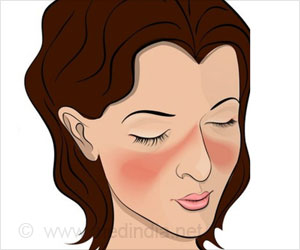World Lupus Day: Having adverse childhood experiences (ACEs) like abuse, neglect and household challenges can ultimately affect lupus symptoms in adults, reveals a new study.

‘Having adverse childhood experiences (ACEs) like abuse, neglect and household challenges can ultimately affect lupus symptoms in adults.’
Read More..




"Our results support the notion that stress in the form of ACEs may be a factor in poor health in systemic lupus, both in disease development and in more severe outcomes," said lead author Kimberly DeQuattro, MD, a clinical fellow in rheumatology at UCSF. "These findings are a call to action to focus efforts on ACE prevention in childhood, as well as clinical and mental health interventions that foster resilience in adulthood."Read More..
Systemic lupus erythematosus (SLE) is an autoimmune disease in which the immune system attacks the body's own tissues, causing widespread inflammation and tissue damage in affected organs. Lupus is influenced by genetics and the environment, with stress acting as a potential trigger of disease onset and flares, and can lead to chronic disability.
Studies have shown that a large percentage of adults have had adverse childhood experiences. According to the U.S. Centers for Disease Control and Prevention, ACEs have been linked to risky health behaviors, chronic health conditions, low life potential, and early death. They also are believed to be a risk factor for autoimmune diseases such as lupus.
In the Arthritis Care & Research study, DeQuattro and her colleagues surveyed 269 lupus patients in the California Lupus Epidemiology Study (CLUES) who completed the ACE questionnaire, a 10-item survey covering abuse, neglect and household challenges. These patients were compared to 6,107 participants from the 2015 California Behavioral Risk Factor Surveillance System (BRFSS), which also includes an ACE questionnaire. The researchers then examined five patient-reported outcomes (lupus flares, damage, depression, physical function and quality of life) with three physician-assessed measures (lupus flares, damage and severity indices) made during an in-person study visit with the patients.
Overall, adverse childhood experience levels were similar for lupus patients and Behavioral Risk study respondents. In lupus patients, 63.2 percent self-reported at least one ACE, and 19.3 percent had at least four ACEs. ACEs were more prevalent in those who were older, female, Latino or African American, without college degrees, and with lupus nephritis (kidney inflammation from lupus).
Advertisement
"This work in lupus patients supports more broadly the body of studies on adversity and trauma in childhood that have found a link between ACEs and health," DeQuattro said. "Our next steps are to look at other types of stress and trauma, how the body responds, and how they relate to lupus outcomes."
Advertisement
Source-Eurekalert










